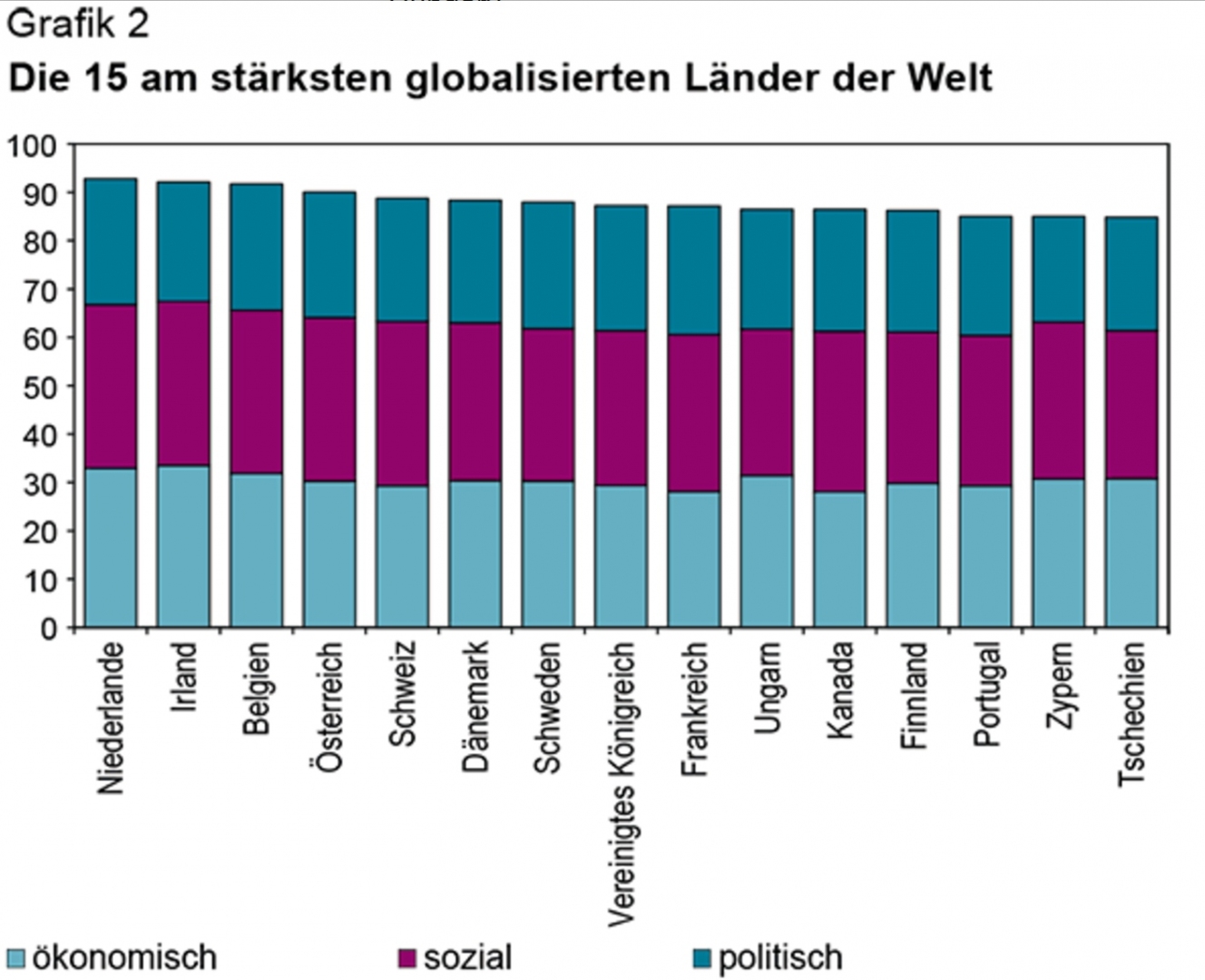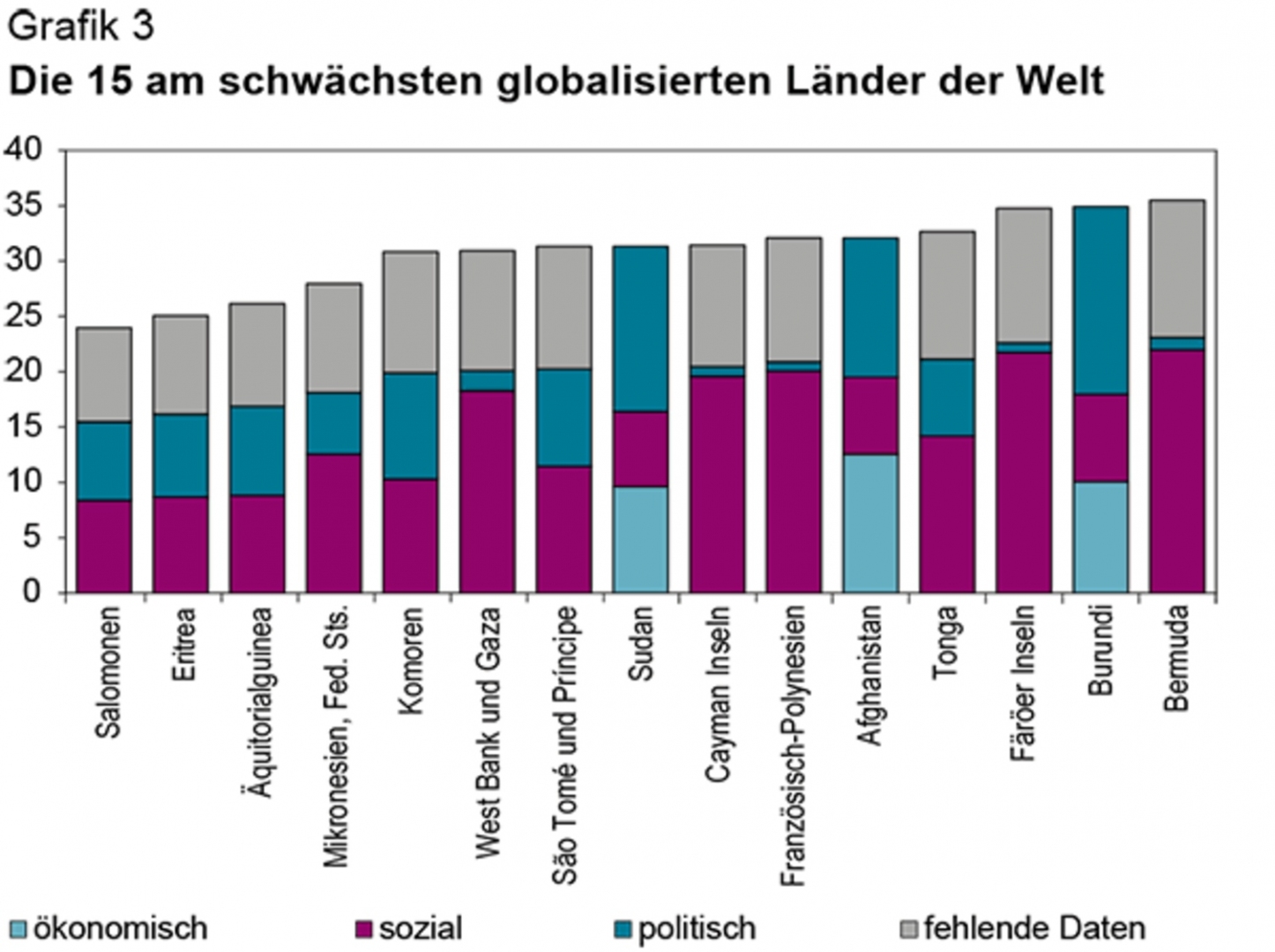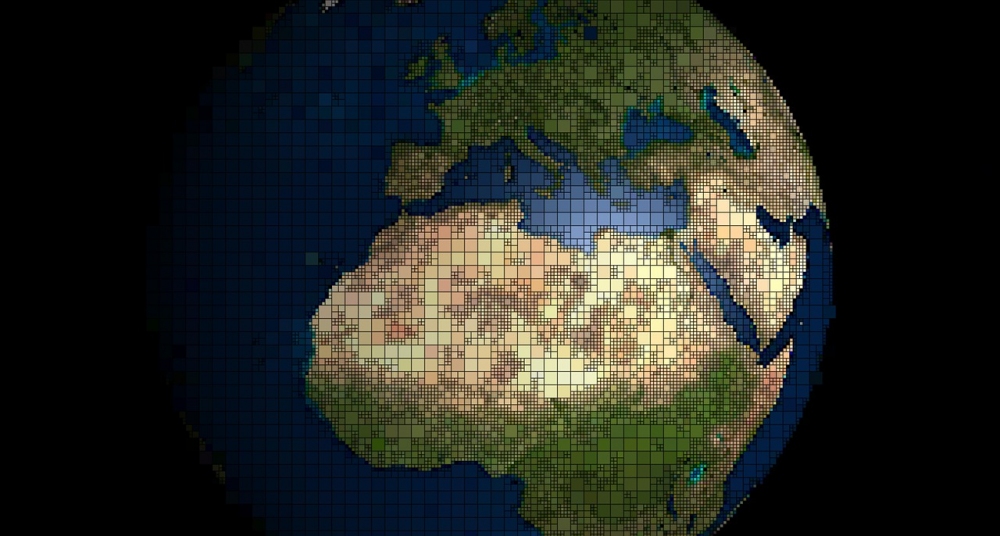KOF Index of Globalization 2017: Netherlands Are the Most Globalized Country
The current KOF Index of Globalization reflects the extent of economic, social and political globalization in 2014. According to the KOF Globalization Index, the degree of globalization was higher in 2014 than in the preceding year, and the rise was the most significant since 2007.
The largest increase was measured in the economic globalization dimension. Political globalization also progressed, while social globalization, the third dimension of the Index, stagnated. Pursuant to the KOF Index of Globalization, the Netherlands are still the most globalized country in the world, followed by Ireland and Belgium. Switzerland is in 5th place.

The year 2014 was dominated by a further recovery of the global economy. Particularly dynamic trends were recorded by the USA and the UK. After setting the course on a number of major political issues, the euro area managed to reduce uncertainty regarding the survival of the currency union. Russia’ annexation of the Crimean peninsula led to political tension in eastern Ukraine and to the imposition of economic sanctions against Russia by a group of western states. The outbreak of the Ebola epidemic in West Africa unsettled the global community.
There was little movement at the top of the KOF Index of Globalization 2014. According to the Index, the Netherlands continued to be the most globalized country in the world, followed by Ireland in second place. Belgium and Austria are in third and fourth place, while Switzerland occupies rank 5. Denmark moved up one rank to sixth place, Sweden advanced two ranks and is now in seventh place. The UK descended two places to 8th position. The 9th and 10th places are occupied by France and Hungary.

Thanks to the size of their markets, the world’s major economies are more inward-looking and tend to occupy lower ranks on the Index of Globalization. The USA, the world’s largest economy, ranks 27 (–1 rank), China 71 (+ 2 ranks), Japan 39 (no change) and Germany 16 (+ 3 ranks).
The lower end of the Globalization Index also showed little movement in 2014. The least globalized country in the world are the Solomon Islands, followed by Eritrea, Equatorial Guinea, Micronesia, the Comoros and the Palestinian territories (in ascending order). Samoa recorded the largest descent in 2014, slipping down 38 places to rank 149. The country reverted predominantly in the field of social globalization. Surinam moved down 33 places to rank 143. Substantial setbacks were also recorded by East Timor (–19 ranks), Nigeria (–16 ranks) and Zimbabwe (–16 ranks). The biggest climbers in the overall index in 2014 were Liberia (+51 ranks), Vietnam (+30 ranks), Congo (+26 ranks), Vanuatu (+24 ranks) and Gabon (+17 ranks).

Economic globalization
The economic dimension of globalization reflects the extent of cross-border trade and investment and revenue flows in relation to GDP as well as the impact of restrictions on trade and capital transactions. The financial crisis of 2008 not only put a stop to the extensive economic integration that had persisted since the 1990s but even reversed the trend to some extent. In 2014, global integration of trade and capital flows largely stagnated. While integration in the field of capital flows increased compared to the previous year, trade flows declined. The trend towards fewer restrictions on trade and capital transactions intensified and the year 2014 saw a further dismantling of non-tariff trade barriers.
Once again, Singapore came out top in the Economic Globalization Sub-Index in 2014, followed by Ireland and Luxembourg. The bottom ranks are occupied by Nepal, Ethiopia and Sudan.
Social Globalization
The KOF Index of Globalization measures the social dimension of globalization in three categories: Firstly, it assesses cross-border personal contacts in the form of telephone calls, letters and tourist flows as well as the size of the resident foreign population. Secondly, cross-border information flows are measured in terms of access to the internet, TV and foreign press products, and thirdly, the index attempts to measure cultural proximity to the global mainstream by means of the number of McDonald’s and Ikea branches as well as book imports and exports in relation to GDP. In 2014, social globalization declined for the first time since the 1970s. However, since the current Index gives little consideration to the substitution of conventional means of communication with digital media, the extent of social globalization is likely to be underrated.
In the Social Globalization Sub-Index 2014, Singapore 2014 moved up two ranks and replaced Austria (now in 5th place) at the top. The second pace is still held by Switzerland, followed by Ireland, which moved up one rank. The bottom end of the Sub-Index is occupied by the Democratic Republic of Congo, Somalia, Tanzania and the Central African Republic.
Political Globalization
The political dimension of globalization is measured in terms of the number of foreign embassies resident in a country, the number of international organisations of which the country is a member, the number of UN peace missions in which the country has been engaged and the number of bilateral and multilateral agreements the country has concluded since 1945. In 2014, France occupies the top rank in this sub-index, relegating last year’s front-runner Italy to second place. Belgium remains in third place. At the bottom of the field are small island states and archipelagos. Compared to the previous year, the degree of political globalization rose in 2014.
Revision of the KOF Index of Globalization
The KOF Index of Globalization is currently being revised. The main changes consist of the breakdown of the economic component into an economic and a financial sub-component. Furthermore, the indicators in each dimension have been broken down into a de facto and a de jure area to allow for greater distinction between the measurement of globalization based on actual flows and measurement based on policies that principally favour these flows. On top of this, new indicators have been added to the KOF Index of Globalization. The revised KOF Index of Globalization is set for publication in autumn 2017.
Methodology
The KOF Index of Globalization, which measures the economic, social and political dimensions of globalization, observes changes in the globalization of a series of countries over a long-term period. Based on 23 variables, the KOF Index of Globalization 2017 covers 187 countries and relates to the period 1970 to 2014. The Index comprises an economic, a social and a political component and measures globalization on a scale from 1 to 100. The underlying variables are divided into percentiles to smooth out outliers and reduce fluctuation over time. The data on which the Index is based were updated for recent years using the original sources. The new data are not comparable with last year’s KOF Index since the database was also updated and recalculated for all previous years. All comparisons with previous years that appear in the above text are based on the new data records.
More Information
Detailed information regarding the KOF Globalization Index 2017 is available here
Source: KOF.ch
